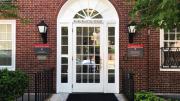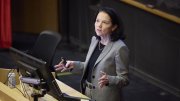The College’s yield for the class of 2024, or the share of admitted students who indicated that they will attend Harvard, has dropped from 84 percent on May 1 to 81 percent, according to a University announcement made today. Some students have deferred their enrollment until next fall due to the COVID-19 pandemic, which accounts for the drop.
Last year’s yield was 82.1 percent; the 84 percent yield earlier this year was the highest since the early 1970s.
First-generation college students make up 18.7 percent of the incoming class, and 22.4 percent of them qualify for the Harvard Financial Aid Initiative’s policy of making the College tuition-free for students whose families earn less than $65,000. The class’s racial makeup is similar to what was already reported about the admitted class in March: 24.6 percent are Asian-American; 13.9 percent are African-American; 11.8 percent are Latinx; and 2 percent are Native American or Native Hawaiian.
Find more of Harvard Magazine’s reporting on what the fall semester will look like here and here.









